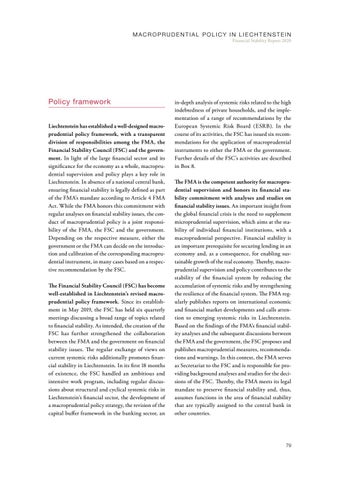M acroprudential policy in L iechtenstein Financial Stability Report 2020
Policy framework Liechtenstein has established a well-designed macro prudential policy framework, with a transparent division of responsibilities among the FMA, the Financial Stability Council ( FSC ) and the government. In light of the large financial sector and its significance for the economy as a whole, macroprudential supervision and policy plays a key role in Liechtenstein. In absence of a national central bank, ensuring financial stability is legally defined as part of the FMA’s mandate according to Article 4 FMA Act. While the FMA honors this commitment with regular analyses on financial stability issues, the conduct of macroprudential policy is a joint responsibility of the FMA, the FSC and the government. Depending on the respective measure, either the government or the FMA can decide on the introduction and calibration of the corresponding macroprudential instrument, in many cases based on a respective recommendation by the FSC. The Financial Stability Council ( FSC ) has become well-established in Liechtenstein’s revised macroprudential policy framework. Since its establishment in May 2019, the FSC has held six quarterly meetings discussing a broad range of topics related to financial stability. As intended, the creation of the FSC has further strengthened the collaboration between the FMA and the government on financial stability issues. The regular exchange of views on current systemic risks additionally promotes financial stability in Liechtenstein. In its first 18 months of existence, the FSC handled an ambitious and intensive work program, including regular discussions about structural and cyclical systemic risks in Liechtenstein’s financial sector, the development of a macroprudential policy strategy, the revision of the capital buffer framework in the banking sector, an
in-depth analysis of systemic risks related to the high indebtedness of private households, and the implementation of a range of recommendations by the European Systemic Risk Board ( E SRB ). In the course of its activities, the FSC has issued six recommendations for the application of macroprudential instruments to either the FMA or the government. Further details of the FSC’s activities are described in Box 8. The FMA is the competent authority for macroprudential supervision and honors its financial sta bility commitment with analyses and studies on financial stability issues. An important insight from the global financial crisis is the need to supplement microprudential supervision, which aims at the stability of individual financial institutions, with a macroprudential perspective. Financial stability is an important prerequisite for securing lending in an economy and, as a consequence, for enabling sustainable growth of the real economy. Thereby, macro prudential supervision and policy contributes to the stability of the financial system by reducing the accumulation of systemic risks and by strengthening the resilience of the financial system. The FMA regularly publishes reports on international economic and financial market developments and calls attention to emerging systemic risks in Liechtenstein. Based on the findings of the FMA’s financial stability analyses and the subsequent discussions between the FMA and the government, the FSC proposes and publishes macroprudential measures, recommendations and warnings. In this context, the FMA serves as Secretariat to the FSC and is responsible for providing background analyses and studies for the decisions of the FSC. Thereby, the FMA meets its legal mandate to preserve financial stability and, thus, assumes functions in the area of financial stability that are typically assigned to the central bank in other countries.
79

